You are here
Adam Arnold interview, 2002
Vertigo Pop! Tokyo - An Interview with Jonathan Vankin
By Adam Arnold
 Who said life in Japan was easy? For the unlucky gaijin, trying to make do in a strange new culture can be quite the bewildering experience. Meet Steve, an average, run of the mill American who dropped everything one day and moved to Japan. But little did Steve know that when he stepped into a phone booth one day to call his girlfriend back in Boston, that his life would suddenly take a drastic turn as he found himself "stealing fancy cars from rock stars."
Who said life in Japan was easy? For the unlucky gaijin, trying to make do in a strange new culture can be quite the bewildering experience. Meet Steve, an average, run of the mill American who dropped everything one day and moved to Japan. But little did Steve know that when he stepped into a phone booth one day to call his girlfriend back in Boston, that his life would suddenly take a drastic turn as he found himself "stealing fancy cars from rock stars."
Steve may be the protagonist, but his involvement in the events unfolding around him is clearly out of his control. His chance phone call to his girlfriend scores him a one-way ticket to the police station, where Japanese cops give him the shake down - and the language barrier doesn't help matters.
Enter Maki, a pink-haired girl dressed in a school uniform. Maki and her friend Mizumi happened to be out looking for a gaijin to practice their English with, and ended up saving poor Steve from the hounding police. Maki invites her newfound friend to go see a concert the next day for the band "One Six Seven" where they proceed to sneak backstage and unwittingly thwart an attempt on the lead singer's life!
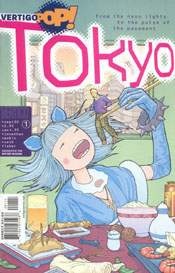 Such is the world of Vertigo Pop! Tokyo, a four-issue mini-series published under DC Comics Vertigo imprint from writer Jonathan Vankin (The Big Book of the '70s, The Big Book of Grimm) and artist Seth Fisher (Green Lantern: Willworld, Flash: Time Flies). The Vertigo Pop! series of comics is a thought provoking look at the influence of American pop culture on the world at large. And the first title, Tokyo, is one that will surely draw anime and especially manga fans into a wild and at times comical new world filled with yakuza, cosplayers, pop stars, and gaijin.
Such is the world of Vertigo Pop! Tokyo, a four-issue mini-series published under DC Comics Vertigo imprint from writer Jonathan Vankin (The Big Book of the '70s, The Big Book of Grimm) and artist Seth Fisher (Green Lantern: Willworld, Flash: Time Flies). The Vertigo Pop! series of comics is a thought provoking look at the influence of American pop culture on the world at large. And the first title, Tokyo, is one that will surely draw anime and especially manga fans into a wild and at times comical new world filled with yakuza, cosplayers, pop stars, and gaijin.
Animefringe had the privilege of sitting down one day with series co-creator Jonathan Vankin and discussing how the series got started and what his inspirations were.
Animefringe/Adam Arnold: To get things started, can you tell where you got the initial concept for the series from and how it got started?
Jonathan Vankin: Shelly Bond, our editor at Vertigo, put Seth Fisher and me together. She had wanted to work with me since I did The Big Book of Grimm. So at the San Diego convention in 2000, she paired me and Seth Fisher together since she knew both of us had lived in Japan, and she asked us to come up with a story set in Japan. I had lived in Japan threes years and Seth had been there four years or maybe more. And that was as they say the genesis of it. After that we came up with some various scattered ideas, but nothing really took shape. We were really shooting in the dark until Shelly came up with a concept called Vertigo Pop! which was this new series that was all set in foreign countries that are influenced by American pop culture. The basic concept behind the story is that teenage girls in Japan control the pop culture. Our character wants to be a big star and she's fascinated by the genre of music called "Visual Kei." After I had the concept, the characters basically wrote themselves.
AF: How many years were you in Japan, actually I mean what years were you there from?
JV: I was there from around 1993 to 1995. So, about three years.
AF: What kinds of fads were going at that time in Japan?
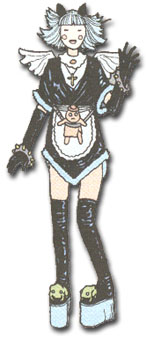 JV: J-pop, but that has always been big. It was just different than it is now. It went through a phase where it was really techno and hip-hop based and now [it's evolved to sound more] pop based.
JV: J-pop, but that has always been big. It was just different than it is now. It went through a phase where it was really techno and hip-hop based and now [it's evolved to sound more] pop based.
AF: Did you ever play any video games like Dragon Warrior or something?
JV: I didn't play much because the language barrier was too great so it wasn't really enjoyable.
AF: You said in the interview at the back of issue one that you weren't as bitter as Steve was.
JV: No. It was around the sixth month there that I was beginning to feel like 'why am I here? I don't belong here.' It's at the six-month point where you start wondering why are you in this place anyway? Steve, in the story, is at that point.
AF: You didn't have any yakuza neighbors, did you?
JV: There were yakuza where I lived in Ikebukuro. You'd always see them hanging around. They had black Mercedes parked at all hours of the night at the end of the street where no one else could park. The yakuza in the story are just everyday guys making their way in the world.
AF: An interesting thing I found was in issue one was that they actually went out and stood in front of the Diet to protest.
JV: That actually happened. It was in the early 90s before I went to Japan. I saw some pictures and they had signs that said in Japanese "Gangsters have rights." But I thought it'd be funnier if they said, "gangsters are people too," so I took a little creative license with that part.
AF: Let's talk about Visual Kei. Did you converse any with Seth to talk about the look for Maki? To me her costume looks like a cross between a maid's outfit and the costume Shadow Lady wears in that Dark Horse manga.
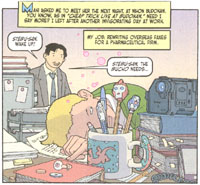 JV: Well, Seth lives in Japan. So, I basically said here are the photo references, but since you're in the midst of it just give your take on it.
JV: Well, Seth lives in Japan. So, I basically said here are the photo references, but since you're in the midst of it just give your take on it.
AF: Yeah, I especially like that little baby she carries around with her in her little pouch.
JV: In the script I described Maki as having an "outrageous costume" and I left it up to him to decide what it was.
AF: Her costumes great. Um, are there any sort of references to anything, well you do mention TV shows, but are there any other sort of references that readers should be aware of?
JV: There are quite a few. I know there are a lot that I missed, but I tried to put as many references of what it's like to actually be there, like the gift-wrapping bit. Issue three has a print club in it.
AF: Oh, sort of like Keitaro's hobby from Love Hina. Um, did you watch any anime series or follow any manga while you were in Japan?
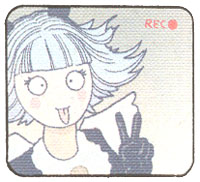 JV: I watched it, but when you're there it's not that big of a deal. It's on all the time. You would see people reading manga on the train, but it's more like... Oh, there's a cartoon on.
JV: I watched it, but when you're there it's not that big of a deal. It's on all the time. You would see people reading manga on the train, but it's more like... Oh, there's a cartoon on.
AF: You were a sports journalist, right?
JV: Yes, that's right.
AF: You wrote in English though, did they translate it for you?
JV: I would get people to translate quotes for me and I would do the rewrite from there. I was primarily a baseball reporter and I would write about six baseball games a night. Sooner or later I learned how to read baseball box scores, and people's names.
AF: So, did you memorize or identify by associating names with the kanji?
JV: Basically. I never studied. I just picked it up.
AF: You've also written some conspiracy books, did you write them before you went to Japan or after you came back?
JV: The first was done before I left and the contract for the other one was signed four days after got to Japan. This meant, I had to go by train to Temple University-Japan and use the English language library there and get people back home to send me books just so I could do research. I remember I had to sit on floor of my house with piles of books scattered around me. It was hard work, but it gave me a unique perspective.
AF: How did you get with DC in the first place to do your Big Books?
JV: I didn't really pursue it. When The Big Book of Conspiracies came out and I saw I was referenced in there, I felt I could have written that book. Instead of getting mad I decided to contact the author. I some how found Doug Moench's phone number and I called him up and we talked about the book. In fact, we became friends after that.
AF: Do you have any tips for fans who might be interested on how get into comic industry?
JV: There is so much competition out there. Since I'm a writer, I can only give tips based on that, but I'd say become a writer first, then become a comic-book writer. Hopefully you'll get noticed and you can pursue comics through that. It's very difficult to make a career out of it though. The chances are you might not be that one person out 1 in 50,000. That's not to say it's not possible. So, be a writer and read a lot, write and hopefully get published, even if you have to self-publish. Editors do read comics. Right around the corner from DC is a store called Jim Hanley's Universe and that's where many editors go to find out what the latest stuff is.
AF: Interesting set of tips. So the first step is to basically become a writer and then get published?
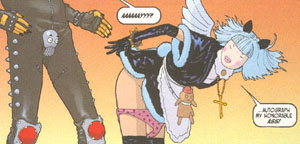 JV: Yeah, getting published is a first step. For comics it involves finding an artist if you are a writer. You have to find the right story and even if you have to self publish, the small press is a good way to go. Editors don't look at ideas or unsolicited material due to legality reasons and they just don't have time, but they do look out for new talent.
JV: Yeah, getting published is a first step. For comics it involves finding an artist if you are a writer. You have to find the right story and even if you have to self publish, the small press is a good way to go. Editors don't look at ideas or unsolicited material due to legality reasons and they just don't have time, but they do look out for new talent.
AF: Is there any word yet on a Vertigo Pop! trade paper back?
JV: I can't say. It's possible, but people need to read the single issues because if they don't sell then they won't do a trade paperback.
AF: Is there anything in the issues published so far that didn't turn out quite the way you had hoped?
JV: In the first issue, the Japanese in the next to last panel. It gives away the surprise in the next panel. That's not the way I wrote it. Overall though, I'm really proud of this project.
AF: What is the main audience, comic fans or anime and manga fans?
JV: Mostly comic fans, because it's a Vertigo imprint which means it's for mature readers and has a limited distribution. So, it's only at comic shops.
AF: You mentioned that Vertigo Pop! is going to be a series of books. Are you going to be a part of the other books?
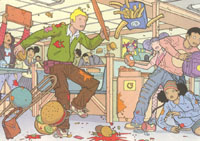 JV: There are three series total, and I'm involved in one of two others. They are three to four issues each, so there will be twelve issues total. Tokyo number four should be out in October. November, December, January and February has London by Peter Milligan and Philip Bond. And I'll be back after that with Bangkok. The artist is Giuseppe Camuncoli. It's a unique series and a real departure from the norm. It's being pegged as a "global reality series," but it's more like travel fiction in a way.
JV: There are three series total, and I'm involved in one of two others. They are three to four issues each, so there will be twelve issues total. Tokyo number four should be out in October. November, December, January and February has London by Peter Milligan and Philip Bond. And I'll be back after that with Bangkok. The artist is Giuseppe Camuncoli. It's a unique series and a real departure from the norm. It's being pegged as a "global reality series," but it's more like travel fiction in a way.
AF: Is there anything else you'd like to add?
JV: Please look forward to Bangkok.
AF: Well, you've definitely got my money.
JV: I'm putting it in my bank account as we speak. [Laughs]
| VERTIGO POP! TOKYO - CHARACTER DOSSIER | ||
 Steve Steve
A gaijin with an obsession for wanting the newest and coolest technological goods on the market. This obsession leads him to jumping on a cheap Korean flight bound for Tokyo, just so he could fulfill his need for cool stuff. He ended up getting a job rewriting overseas pharmaceutical faxes, but his feelings of bewilderment have forced him to be in a perpetual state of being pissed off. |
 Maki-chan Maki-chan
A young girl who doesn't want go to college or be a flight attendant for the rest of her life. No, she simply wants to be a star. Her best friend is Mizumi, whom she was with at the time she meet Steve. One fateful day she and her friend Mizumi went out to find some gaijin to practice English with, and things just went out of control from there. |
 Mizumi-chan Mizumi-chan
Maki's best friend whose test scores are really crappy and more than likely will end up working as a flight attendant. Mizumi knows Maki's rather unpredictable personality and can easily help figure out where she's gotten off too. |
 Hiki Hiki
The lead singer for the band "One Six Seven" who has found himself in a heap of trouble because of his rebellious stance against the yakuza. His career has gained him an exorbitant amount of fame, though the average girl on the street wouldn't know what he looked like without his make-up on. |
 Ryuji-kun Ryuji-kun
A yakuza with rather unique fashion sense. He dresses in a leather jacket and has his hair done up in a punch-perm to better express his tough guy attitude. Ironically, his mom was concerned for him, so she signed him up for the mob and ever senses he has been a part of the Suki-gumi family. |
 Hara-Kun Hara-Kun
Ryuji's fellow yakuza. Hara-kun often ends up on Ryuji's case because he always ends up being the person who is forced to take up the slack when something goes wrong. The problem is, Hara-kun's luck seems to be getting worse. |
- Log in to post comments







